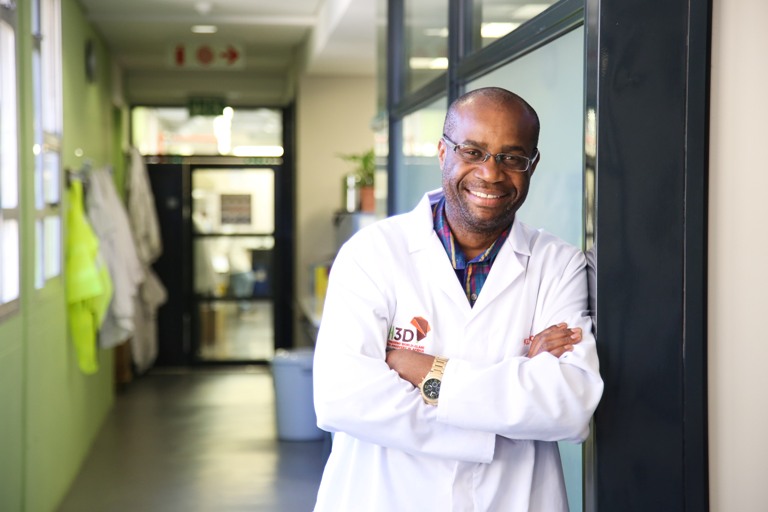
UCT Researcher Wins Major South African Award And Calls For a Pipeline Of Science Jobs in Africa
Professor Kelly Chibale, founder and director of the Drug Discovery and Development Centre, H3D, at the University of Cape Town, has been awarded the prestigious Gold Medal for 2018 by the South African Chemical Institute (SACI). Chibale said he was deeply honoured by the award, which is made to a person whose scientific contribution in […]

Professor Kelly Chibale, founder and director of the Drug Discovery and Development Centre, H3D, at the University of Cape Town, has been awarded the prestigious Gold Medal for 2018 by the South African Chemical Institute (SACI).

Chibale said he was deeply honoured by the award, which is made to a person whose scientific contribution in the field of chemistry or chemical technology is judged to be of outstanding merit.
The H3D director is using the opportunity of the SACI honour – as well as public platforms locally and globally – to raise awareness of the critical need to invest in a Research & Development (R&D) industry that could create a pipeline of jobs for science graduates in Africa.
H3D works mainly in the fields of tuberculosis and malaria and already has a potential drug for malaria in human trials. The drug has the potential to kill the malaria parasite at multiple stages.
Chibale said H3D had proved that science creates jobs, but that it needs sustained commitment and investment for this to be replicated across the continent.
“Many science graduates in Africa are unemployed and the situation is getting worse. For some time now, this has fuelled the brain drain to Europe, the UK or North America,” said Chibale.
Chibale, who has been listed as one of Fortune magazine’s ‘50 World’s Greatest Leaders’ for 2018 for his pioneering work, sees tremendous opportunities if there could be more investment from African governments, the private sector, donors and other partners.
H3D, Africa’s first drug discovery and development centre, has grown from a staff of five in 2011 to over 60.
“There’s a big opportunity for interaction between the R&D value chain and the manufacturing value chain. Jobs can be created through R&D at different stages of the value chain,” he says.
For example, in the preclinical discovery phase, there are opportunities for companies to be set up locally to offer a supply of chemical intermediates, analytical services, Contract Research and Manufacturing Services. When a preclinical drug development candidate is identified, there are additional opportunities for companies to be set up to scale up on the large-scale manufacture of the active pharmaceutical ingredient (API) for human clinical trials.
H3D is currently involved in two initiatives to help boost drug discovery and development research and innovation in Africa.
One of them is a local pilot project with Walter Sisulu University (WSU), aimed at boosting the sustainable training of African scientists, with the aim to build drug discovery capacity at Historically Disadvantaged Institutions (HDIs). The South African Medical Research Council (SAMRC) has provided the initial funding for the WSU project and is a partner with H3D in this programme.
The other is the Grand Challenges Africa drug discovery programme to support new drug discovery projects in Africa. H3D, the Bill & Melinda Gates Foundation (BMGF), Medicines for Malaria Venture (MMV) and the African Academy of Sciences (AAS) are working together to support new projects by offering grants as well as extensive support to projects involved in drug discovery and development, particularly in malaria and tuberculosis.
Over the past month, Chibale has shared his message at major international platforms, describing how Africa can be a source of health innovation and can lead international efforts to discover new medicines.
He was recently honoured by the American Society of Tropical Medicine and Hygiene (ASTMH) with the 2018 Commemorative Fund Lecture – one of the society’s most prestigious. Chibale delivered the lecture at the Society’s 2018 Annual Meeting in New Orleans.
He also presented a Spotlight talk at a joint plenary session of the BMGF Grand Challenges annual meeting and Keystone drug discovery symposium in Berlin in October to a collective audience of several thousand attendees, many of them influential leaders in their fields.
Working with the former US President Barack Obama Foundation, he has also shared his experiences with emerging leaders across Africa, who are part of the one-year Obama Foundation Leaders: Africa programme.
Professor Chibale spoke about his passion for addressing youth unemployment and overcoming obstacles on the road to success.
“In H3D, we have an African-led model that works. It is a tremendous opportunity now to expand this footprint and replicate this model across Africa. Fund entrepreneur research centres like H3D to create more jobs and fund them not just to survive, but to succeed. We need a critical mass of people to sustain this industry into the future,” said Chibale.
“We have the ability to build an African, innovative R&D pharmaceutical industry that not only delivers clinical candidates, but also high level jobs to science graduates, future project leaders and a critical mass of skilled scientists.”
